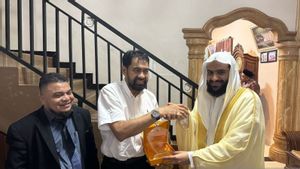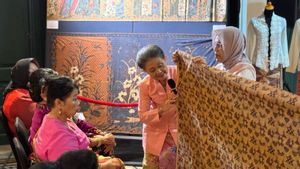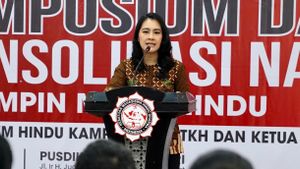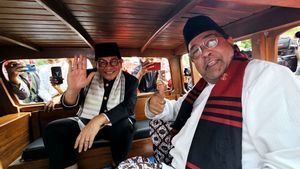JAKARTA - The word 'woman' is becoming a hot topic of conversation in the community. Some people consider the word woman as a negative connotation in the search field kkbbi.web.id. This started with protests by the vocalist of the band Barasuara, Asteriska
Reporting from the KBBI compilation team, Thursday, February 4, the word woman, like other common words, has been included in KBBI since the first edition was published in 1988. At that time, this word was given the definition of only synonyms, namely 'woman' and 'chant '.
In subsequent editions, the definition was changed in the form of an explanation as 'a person (human) who has a breast, can menstruate, become pregnant, bear children, and breastfeed'.
From the second edition onwards, the definition of this word has been added with one more, namely 'female' which is equipped with the explanation 'specifically for animals'.
In this first edition, several combinations of words whose main elements are women are included, such as deck women, bad women, street women, bitches, bad women, broken women, and naughty women.
In subsequent editions, this combination of words was added to the subentries of prostitutes (KBBI edition 2) and mistresses (KBBI edition 3).
Until the 5th edition of KBBI there was no additional combination of words under the female entry. However, several adjustments were made, especially in terms of changing the defining word in this entry, namely that the word puki in editions 1 and 2 was changed to vagina in the 3rd edition onwards.
In terms of defining women, the word 'person' or 'human' is the closest type, while 'those who have a vagina, can menstruate, get pregnant, give birth to children, and breastfeed' are the distinguishing features of other human types.
The first definition of the female entry, which mentions physical characteristics, is the description used to describe gender.
In other languages, for example English, the word used to describe this gender (female) is different from the word used to describe the person (woman), so that the definition of woman does not explain her physical characteristics.
The word female can be equated with the word female in Indonesian, but this word is only used to describe the sex of an animal and is never used for humans. Thus, the word woman in Indonesian serves to indicate gender.
KBBI is a general dictionary which is historical in nature. This means that KBBI records all linguistic facts that have been and are currently living in the Indonesian speaking community. Apart from the historical dictionary, KBBI is also a living dictionary.
Every time a new concept or meaning appears at a time, the concept and meaning are recorded in chronological order. The words and meanings are presented according to the order of their development, from the meaning that initially appeared to the meaning that is currently understood.
Sophisticated entry, for example, is defined by the first meaning 'many say' because it is that meaning which comes first in its use. Sophisticated meaning related to modern technology has only appeared in the past few decades so that its listing in the KBBI is fourth.
The chronological order is also determined based on the formation or occurrence of a concept. Coffee entries and some other entries of plant origin, for example, are defined first as 'tree', then 'fruit', then 'powder', and then finally 'drink'.
Since its inception, KBBI has had such an editorial policy which has become a convention that has been mutually agreed upon by its editorial team.
Based on the convention, the collection of KBBI entries is currently growing rapidly in line with the development of information technology which makes it easier for KBBI editors to search, collect, select, and validate entries that will enter KBBI.
One of the requirements for the entry of a word in the KBBI is the high frequency of use which must be proven from existing data or language corpus.
Apart from written data, data that comes from digital sources is a very helpful source in verifying the use of words that are factually used.
Collecting data based on corpus is a form of accountability by the KBBI editorial team in entering a word as an entry in the dictionary.
Regarding the reliability of the data, the combination of words in women's entries such as deck women, bitches, and mistresses is very easy to find in corpuses with a high frequency of use.
Based on this, the editorial team has very strong reasons to keep it as a linguistic fact that must be recorded in the dictionary. This kind of practice is very common in lexicography and is known as the principle of corpus-based or corpus-driven lexicography.
This means that the preparation of the dictionary really relies on the corpus which is presented as it is, without any modification. As for the social picture that emerges from the presentation of information in the dictionary is not an ideal condition, it is another discussion.
In fact, in the modern lexicographic approach, the dictionary is an honest description of the social and cultural conditions of a society. There is an adage which states that if you want to see the civilization of a nation, look at the language and the language is stored in a treasure called a dictionary.
The explanation of women's entries in KBBI can be used as an example of how society views women and what connotations are attached to women.
The negative connotations and stigma of women can be changed not by changing the explanation of the entry in the KBBI, but by changing the connotation and stigma of society towards women at a higher level. If changes in the negative connotations and stigma of society towards women can be made, new entries with positive meanings will appear in the corpus and be recorded in the KBBI naturally.
The English, Chinese, Japanese, Arabic, and French versions are automatically generated by the AI. So there may still be inaccuracies in translating, please always see Indonesian as our main language. (system supported by DigitalSiber.id)













